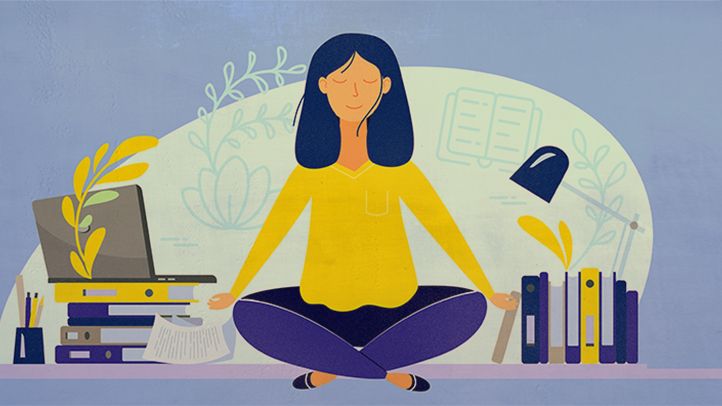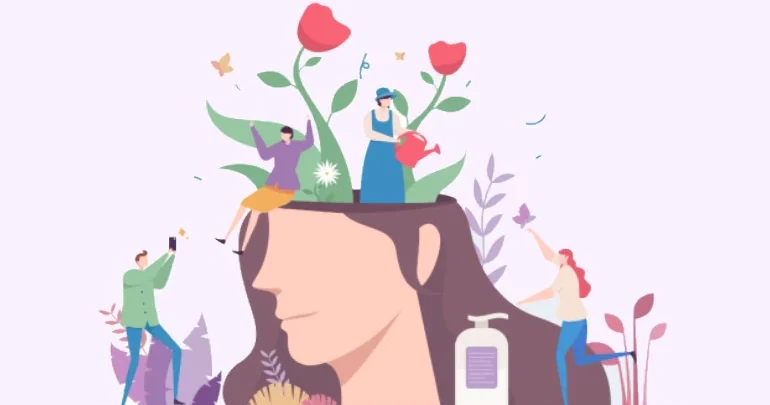Introduction
In this fast-paced and demanding world, maintaining our mental well-being has become more important than ever. In this blog series, we will explore strategies and techniques that can help you master your mind, cultivate inner peace, and achieve a state of mental clarity and balance. The human mind is a powerful and complex tool, capable of great creativity and resilience. However, it can also become overwhelmed by stress, negative thoughts, and distractions, hindering our ability to live a fulfilling and harmonious life. That's why it's crucial to develop strategies to take care of our mental health and harness the full potential of our minds.
Developing a Positive Mindset: Achieving Mental Clarity and Balance
Establishing healthy habits is one of the most important steps to improving mental clarity and balance. Mental clarity and balance are essential for overall wellbeing, and healthy habits can help to achieve this. Healthy habits can help to reduce stress, increase focus, and improve mental health.
One of the most important healthy habits to establish is to get enough sleep. Getting enough sleep helps to reduce stress and improve focus. It also helps to regulate mood and improve overall mental health. It is recommended to get least seven to eight hours of sleep per.
Another important healthy habit to establish is to practice mindfulness. Mindfulness is the practice of being aware of the present moment and accepting it without judgment. Practicing mindfulness can help to reduce stress and improve mental clarity. It can also help to increase focus and improve overall mental health.
Eating a healthy diet is also important for improving mental clarity and balance. Eating a balanced diet that includes plenty of fruits, vegetables, and whole grains can help to reduce stress and improve mental health. It is also important to limit processed and sugary foods, as these can have a negative impact on mental health.
Exercising regularly is also important for improving mental clarity and balance. Exercise helps to reduce stress and improve focus. It can also help to regulate mood and improve overall mental health. It is recommended to get at least 30 minutes of exercise per day.
Finally, it is important to practice self-care. Self-care is the practice of taking care of yourself and your mental health. It can include activities such as journaling, meditating, and spending time in nature. Practicing self-care can help to reduce stress and improve mental clarity.
Establishing healthy habits is an important step to improving mental clarity and balance. Healthy habits such as getting enough sleep, practicing mindfulness, eating a healthy diet, exercising regularly, and practicing self-care can all help to reduce stress and improve mental health. Establishing these healthy habits can help to improve mental clarity and balance and lead to overall wellbeing.
Exploring Mindfulness Practices to Enhance Mental Clarity and Balance

Mindfulness practices are becoming increasingly popular in today’s world as a way to enhance mental clarity and balance. Mindfulness is a way of paying attention to the present moment with an attitude of curiosity and acceptance. It is a practice of focusing on the present moment, being aware of our thoughts, feelings, and sensations without judgment.
Mindfulness can help us to be more aware of our thoughts and feelings, which can lead to improved mental clarity and balance. By being aware of our thoughts and feelings, we can become more aware of our reactions to situations and make better decisions. Mindfulness can also help us to become more aware of our body’s physical sensations, which can help us to recognize when we are feeling stressed or overwhelmed.
Mindfulness practices can also help us to become more aware of our environment and the people around us. This can help us to become more present in our relationships and better able to recognize when we need to take a break or step away from a situation.
There are many different mindfulness practices that can be used to enhance mental clarity and balance. These include mindful breathing, mindful walking, mindful eating, and mindful meditation. Mindful breathing involves focusing on the breath and noticing the sensations in the body as you inhale and exhale. Mindful walking involves paying attention to the sensations in the body as you walk and noticing the sights, sounds, and smells around you. Mindful eating involves being aware of the sensations in the body as you eat and noticing the flavors and textures of the food. Mindful meditation involves focusing on the breath and noticing the thoughts and feelings that arise without judgment.
These mindfulness practices can be done anywhere and anytime, and they can be done for as little as five minutes or as long as you like. Taking time to practice mindfulness can help to reduce stress and anxiety, improve focus and concentration, and increase self-awareness.
Mindfulness practices can be an effective way to enhance mental clarity and balance. By taking time to practice mindfulness, we can become more aware of our thoughts and feelings, become more present in our relationships, and better able to recognize when we need to take a break or step away from a situation. Mindfulness can be a powerful tool to help us to live more fully in the present moment and to create a more balanced and peaceful life.
Strategies for Letting Go of Stress and Anxiety to Achieve Mental Clarity and Balance
Stress and anxiety can be overwhelming and difficult to manage. It can cause physical and mental health issues, and can interfere with our ability to live a balanced and fulfilling life. Fortunately, there are strategies we can use to let go of stress and anxiety and achieve mental clarity and balance.
The first step in letting go of stress and anxiety is to recognize and acknowledge it. When we recognize our stress and anxiety, we can begin to identify the sources of our distress and take steps to address them. This can include identifying and challenging negative thoughts and beliefs, and finding healthier ways to cope with difficult emotions.
Another important strategy for letting go of stress and anxiety is to practice self-care. This can include engaging in activities that bring us joy and relaxation, such as reading, listening to music, or taking a walk. It can also include engaging in activities that help us to manage our stress and anxiety, such as yoga, meditation, or journaling.
We can also let go of stress and anxiety by connecting with others. Spending time with supportive friends and family can help us to feel less alone and overwhelmed. It can also provide us with a sense of connection and belonging.
Finally, we can let go of stress and anxiety by focusing on the present moment. This can include engaging in mindfulness activities, such as mindful breathing or body scans. It can also include engaging in activities that help us to appreciate the beauty and joy in our lives, such as taking time to appreciate nature or engaging in creative activities.
By recognizing and acknowledging our stress and anxiety, practicing self-care, connecting with others, and focusing on the present moment, we can let go of stress and anxiety and achieve mental clarity and balance. These strategies can help us to feel more in control of our lives and to live more fully and joyfully.
Cultivating Self-Awareness to Enhance Mental Clarity and Balance
Cultivating self-awareness is a powerful tool to enhance mental clarity and balance. Self-awareness is the ability to recognize and understand our thoughts, feelings, and behaviors. It allows us to gain insight into our strengths and weaknesses, and how our actions affect others. When we are self-aware, we can make conscious choices that lead to positive outcomes.
Self-awareness can help us to become more mindful of our thoughts and feelings. This can lead to improved decision-making and better relationships. It can also help us to identify and address any underlying issues that may be causing us distress. By recognizing our triggers and patterns of behavior, we can make more informed choices that are in line with our values and goals.
Self-awareness can also help us to manage stress and anxiety. When we are aware of our thoughts and feelings, we can better understand our reactions to stressful situations. This can help us to take a step back and respond in a more productive way. We can also use self-awareness to recognize our own limits and take steps to prevent burnout.
Self-awareness can also help us to develop a greater sense of self-compassion. When we understand our own needs and feelings, we can be more understanding and forgiving of ourselves. This can help us to accept our flaws and mistakes, and move forward with greater confidence.
Finally, self-awareness can help us to cultivate a greater sense of inner peace and balance. When we understand our thoughts and feelings, we can better recognize our triggers and take steps to manage our emotions. This can help us to remain calm and focused, even in challenging situations.
Cultivating self-awareness is an essential part of living a healthy and balanced life. By recognizing our thoughts and feelings, we can make conscious choices that lead to positive outcomes. We can also develop a greater sense of self-compassion and inner peace. By taking the time to cultivate self-awareness, we can enhance our mental clarity and balance.
Excerpt
Achieving mental clarity and balance is essential for leading a healthy and successful life. With the right strategies, you can master your mind and create a positive outlook. These strategies include setting realistic goals, practicing mindfulness, and taking breaks to relax and refocus. With a clear and balanced mind, you can achieve your goals and live a happier life.



